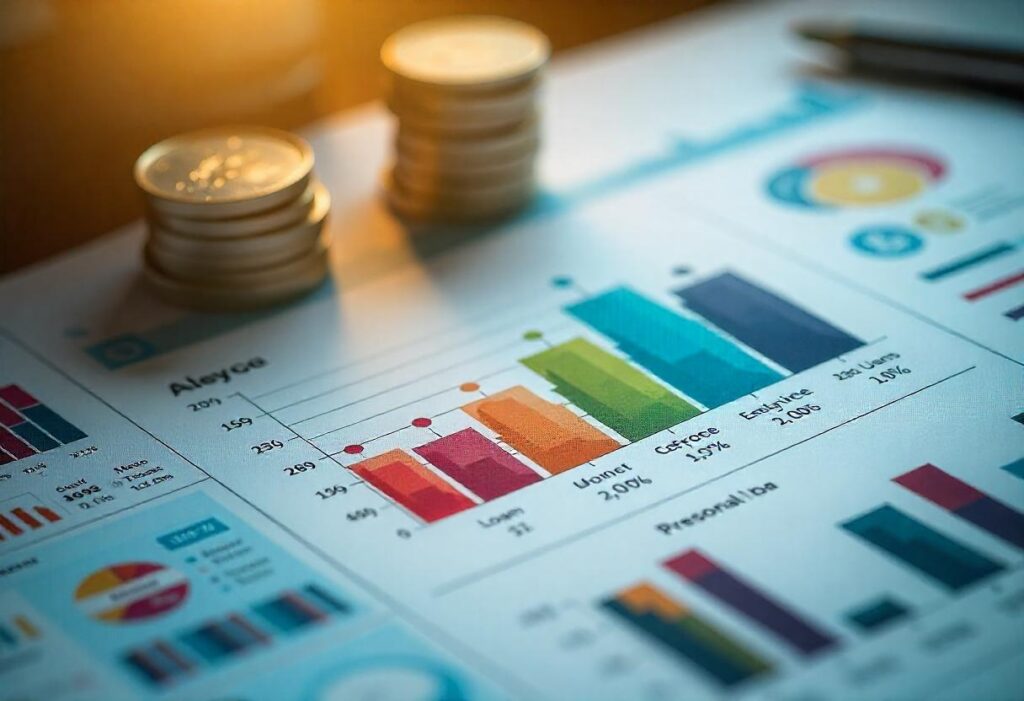They can be costly, but they might be your best option sometimes.
A personal loan can be utilized for various purposes, such as consolidating, funding home renovations, or addressing medical expenses. The interest rates are usually much lower than credit APRs, making them an appealing choice, particularly for those who lack collateral.
However, personal loans often come with higher costs compared to other alternatives, like home equity loans, especially if your credit score isn’t great. Here’s how to determine if a personal loan suits your needs.
Key Takeaways:
- Personal loans can serve almost any financial requirement.
- According to an Investopedia survey, debt consolidation is the primary reason for taking out a personal loan.
- Unlike mortgages or car loans, personal loans typically don’t require collateral.
- Personal loans can be more affordable than credit cards and some other loans but can be pricier than others.
Understanding Personal Loans
A personal loan is generally an unsecured loan, meaning the lender doesn’t ask for collateral—such as a home or vehicle—to issue the funds. However, since unsecured loans carry a higher risk for the lender, they usually come with elevated interest rates compared to secured loans. The interest rate you’ll receive depends on various factors, including your credit score and debt-to-income ratio.
Some financial institutions do offer secured personal loans, where your collateral might be your bank account, vehicle, or other assets. Secured personal loans may be easier to qualify for and could offer slightly lower interest rates than unsecured loans. Keep in mind, though, that if you fail to make payments, you risk losing the collateral.

Even with unsecured loans, missing payments can negatively impact your credit score and limit your ability to obtain credit later. According to FICO, the company behind the most widely recognized credit score, your payment history accounts for 35% of your score, making it a crucial factor.
When to Think About a Personal Loan
Before deciding on a personal loan, assess whether more affordable borrowing options are available. Some reasons to consider a personal loan include:
- You lack a low-interest credit card or cannot qualify for one.
- The credit limits on your cards do not satisfy your current borrowing needs.
- A personal loan presents the least expensive borrowing choice for you.
- You do not possess any collateral to provide.
You might also find a personal loan useful if you need funding for a defined period. Personal loans typically range from 12 to 60 months. For instance, if you expect a lump sum payment in two years but need funds in the meantime, a two-year personal loan could serve as a bridge.
Here are five additional scenarios where a personal loan might be beneficial:
1. Consolidating Credit Card Debt
If you have a large balance on one or more high-interest credit cards, a personal loan could lower your interest payments. As of September 2024, the average credit card interest rate stood at 24.74%, while personal loans averaged 11.92%. This difference can help you reduce your balance faster and pay less interest overall. Furthermore, it’s simpler to manage a single debt instead of multiple debts.
However, a personal loan isn’t your only option. You might qualify for a balance transfer credit card with a lower interest rate or even a promotional period with no interest for several months.
2. Paying Off Other High-Interest Debts
Although personal loans can be pricier than other loans, they might not be the most expensive choice available. For example, payday loans typically have much higher interest rates than bank personal loans. Additionally, if you hold an older personal loan with a higher rate, refinancing it with a new loan could yield savings.
Before switching out a loan, check for any prepayment penalties on the existing loan or any potential application or origination fees for the new loan, which can sometimes add up.
3. Financing Home Improvements or Major Purchases
For larger purchases like new appliances or a heating system, using a personal loan may be more affordable than financing through the retailer or charging it to a credit card.
However, if you have equity in your home, a home equity loan or line of credit might be less costly. Keep in mind that both of these options are secured loans, which puts your home at risk.
4. Funding a Major Life Event
Financing significant events like a bar or bat mitzvah, a milestone anniversary, or a wedding may be more economical with a personal loan than using a credit card. A 2021 survey by Brides and Investopedia found that about one in five couples in the U.S. will tap into loans or investments for their wedding.
While these events are important, you should consider trimming costs if it means taking on long-term debt. Similarly, borrowing for a vacation may not be wise unless it’s a once-in-a-lifetime trip.
Important:
A personal loan can enhance your credit score when paid punctually. But if mismanaged, it could negatively impact your score.
5. Boosting Your Credit Score
Taking out a personal loan and repaying it on time might improve your credit score, especially if you’ve had trouble keeping up with other debts. If your credit history shows primarily credit card debt, introducing a personal loan could diversify your “credit mix.” Lenders generally view managing different loan types responsibly as a positive for your credit score.
That said, borrowing money unnecessarily in hopes of improving your score can be risky. It’s better to focus on paying all your bills on time while striving to maintain a low credit utilization ratio, which compares your current credit usage to your total available credit.
How People Utilize Personal Loans
Investopedia conducted a national survey between August 14, 2023, and September 15, 2023, involving 962 U.S. adults who had taken out a personal loan. The majority cited debt consolidation as the main use for their loans, followed by home improvements and other significant expenses.
When Not to Use a Personal Loan
While personal loans can be applied for many purposes, certain situations are best avoided. Most lenders typically prohibit using personal loans for:
- Educational expenses like tuition, room, board, and student loan debts
- A house down payment
- Business costs
- Investments
- Gambling
Note:
Lenders will require you to specify the purpose of your personal loan during the application process.
Additionally, it’s wise to refrain from using personal loans for basic living costs, as this can lead to a cycle of debt. Use your income to cover everyday expenses whenever possible.
Frequently Asked Questions (FAQs)
What Can I Use a Personal Loan For?
A personal loan can be utilized for almost any purpose, including significant purchases, home improvements, debt consolidation, or emergency expenses. However, many lenders restrict personal loans for postsecondary education expenses, down payments on homes, or business financing.
What Do I Need to Secure a Personal Loan?
Each lender has distinct requirements for personal loan applications. Yet, many personal loans are unsecured, meaning you won’t need collateral.
Can I Use a Personal Loan for Educational Expenses?
Most lenders do not allow the use of personal loans for education-related costs like tuition or for paying off student loans.
The Bottom Line
Personal loans can be advantageous in various situations. Although they may not be the cheapest option available, understanding your choices is crucial. If you’re considering one, tools like Investopedia’s personal loan calculator can help you gauge the costs and whether they align with your budget.

